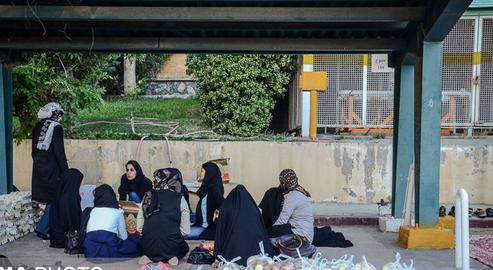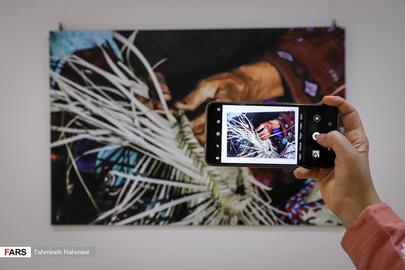Orphans and homeless women. Runaways. People lacking the money for medical treatment. Those deprived of classrooms and education. The children of addicts. Poor families living on food packages. Women heads of households, trying to scratch together a business.
All these people and more rely on the Imam Ali Society, full name the Imam Ali's Popular Students Relief Society, otherwise known as the Society of Students Against Poverty. This nonpartisan student NGO was set up in 1999 and today is a well-established charitable relief organization with thousands of volunteers and several offices in Iran. Its position suddenly appears to be in jeopardy, with three of its senior members abruptly arrested this week and now languishing in prison.
According to a statement issued by the Imam Ali Society, on the afternoon of Sunday, June 21, two groups of law enforcement officers entered the home of the organization’s founder, Sharmin Meymandinejad. They had with them a written complaint lodged against Meymandinejad by the Sarollah Camp, an arm of the Islamic Revolutionary Guard Corps.
The IRGC charged Meymandinejad and other founding Society members with "insulting the Supreme Leader as well as insulting the founder of the Islamic Republic". Morteza Kaymanesh, the Society’s head of media, and Katayorn Afrazeh, its acting inspector, were also detained on charges of “acting against national security”. Security forces also searched the Society’s offices and confiscated documents and computers.
Media outfits linked to Iran’s security services have trumpeted the arrests and offered up a range of speculative material aiming to justify them. The IRGC-controlled Tasnim News Agency called the Imam Ali Society an organization that – on the pretext of public benefit – had set up a network intending to influence various spheres of public opinion. Meanwhile, the notorious Kayhan newspaper has published a detailed article about the family history of Sharmin Meymandinejad, calling the members of this association "criminal benefactors".
Long-time Associates Aghast at News of Arrests
The Imam Ali Society has been in operation for more than 30 years. It has ten thousand volunteers on the books and through its various charitable and outreach activities, has helped innumerate people – especially women and children – in deprived parts of the country. It also runs 33 “Iranian Homes”: support hubs embedded in communities, offering services such as therapy and counseling, educational classes and cultural and sporting activities.
Individuals who have become accustomed to the services of Imam Ali Society volunteers are horrified by news of the arrests.
"Twenty years ago,” one person writing on Twitter recalls, “these volunteers taught my mother become literate. My mother sent me to school, and then the Imam Ali Society helped me get my bachelor's degree. They gave me a place to be and help others, and now its founders have been arrested, I feel attacked."
A volunteer in Qasr-e Qand city in Sistan and Baluchestan province, named Gohar, explains that the work of the Society in areas of indescribable poverty has proved to be a source of positive change.
“Two years ago,” she remembers, “a woman with five young and old children in a deprived neighborhood died due to poverty and malnutrition. We were told that the family could not even pay for the funeral.
“I was in contact with members of the Society in Tehran and told them about the situation. I was asked to visit the children and give them some money to help bury their mother.
“When we got there, one of the neighbors told me this woman had not eaten for many days so that her children could have bigger portions. He said the woman's liver had been severely damaged and her weight had dropped to 47 kilograms.
“We tried to take care of the children. Their father was an Afghan national and none of them had any paperwork. The companions of the Imam Ali Society first put in significant effort so that I could get their birth certificates for them.
“We encouraged the older daughter, who was 13 years old and on the brink of a forced marriage to reduce the number of mouths to feed, to attend sewing and needlework classes. Now, you wouldn’t believe how the families’ lives have improved by the work of this same girl. With the help of friends on social media, I bring in orders for needlework for them."
The last thing Gohar did to help the family was buy them one tanker of water to keep in reserve, so the girls would not have to travel long distances – from their side of the Kohan-e Olya village to the other end of the district – to fill their water containers.
Gohar says the Imam Ali Society volunteers were constantly calling from Tehran to make sure the birth certificates were being processed. What is the benefit to them, she wonders, of rigorously pursuing the correct documentation for a handful of homeless children on the other side of the country? How could an organization like this be conspiring against people?
Elsewhere, with the help of other volunteers, Gohar has repeatedly distributed food and dry milk in the Telang, Kajeh, and Khash areas, also delivering school equipment such as bags, shoes, and stationery to children at the beginning of the academic year. She says she has also witnessed how the Imam Ali Society’s Qasr-e Qand House of Employment in Sistan and Baluchestan has helped empower local Baluch women and motivate them to learn more by running needlework and tailoring classes.
What Might the Motive Be?
The news agency Mashreq wrote of the activities of Imam Ali Society members: "We will not be surprised if one day it turns out that the leaders of this association engage in the trafficking of human organs, or help smuggling weapons to terrorist groups in the border areas."
For Mehdi Soleimanzadeh, who volunteered with the Society during his student days in Tehran, the statement is preposterous. Members of this group, he says, are committed, scrupulously moral, and benevolent. "I have worked intermittently with this group for almost three years, and not once did I ever witness inhumane, questionable, or even ambiguous behavior. I was not a full member, but I think their team works with a healthy mentality and humanitarian motivation."
Referring to the character assassination published by Kayhan on Tuesday, June 23, Soleimanzadeh says he believes the growing popularity of the Imam Ali Society in the hearts of ordinary people was bothering the regime.
“I was shocked to read the accusations,” he said. “Maybe I would be more hesitant if I hadn't worked directly with that organization myself. Where does all this resentment and jealousy and enmity come from?
“In my opinion, they consider any independent activity – and public popularity – a serious threat to themselves. Obviously, the Society’s sin was to divert the money that was supposed to go to the pockets of the mullahs in the name of khums [an Islamic tax meant to be re-routed to charitable causes] and zakat [mandatory charitable contributions], and to get these donations to the real deserving people.”
Historian Blames Regime’s Insecurity for Arrests
Mobina Azari, a university lecturer, is one of the many people who have occasionally worked alongside the Imam Ali Society down the years. "I don't know whether I could be called a volunteer or not,” she says, “but I attended the Society’s ceremonies and received some piggy banks from them, which I used to collect donations from people around me.”
She says what caught her attention from day one was the easy accessibility of its members to the needy and the poor. "Note the logical structure of the organization,” she says, “and the significant extent of its coverage. Nearly 10,000 volunteers work with them, and each of these 10,000, who have a benevolent disposition, interacs with other members of society. It is a kind of vast social network that battles growing poverty."
As far as Azari can remember, no one ever asked her about her religion or faith during her collaboration with the Imam Ali Association. “They were more humanist.
“It is now alleged that several members or volunteers were part of the Erfan-e-Halgheh spiritual group [disciples of a form of mysticism who face persecution in Iran]. First of all, what's wrong with that? Secondly, even assuming this to be true, I am still sure that this matter is not of anyone's concern – any given religious commitment, at least as far as my experience shows, is not a condition for anyone’s cooperation. Any person of any faith or creed could be a volunteer if he or she wanted to be."
Azari speculates that the sheer scale of the organization is a matter of concern for Iran’s ruling system. Generally speaking, third sector activity in the Iranian population has shifted from registration with the Ministry of Interior to membership in international organizations and groups: a potential sign of widespread mistrust either in the government at large, or of its ability to govern. The Imam Ali Society itself is registered with the United Nations Economic and Social Council (ECOSOC) and has been for 20 years.
"The Society’s offices are based in universities,” says Azari. “These are sensitive locations, and the number of volunteers is expanding day by day, and people's trust in them is greater than the Imam Khomeini Relief Foundation - which could have led to a reaction.”
Azari, a historian, points to the fact that most social uprisings have their origins among the poor and dispossessed. “The Imam Ali Society has access to deprived areas and needy families on a large scale, and they conduct various expeditions and ceremonies. It is natural that they are popular among the people.
“Iran’s poor are restless. Especially in the current situation, where people's lives are deteriorating and poverty has reached record levels. The fear that the association will be able to provide the conditions for change, from the heart of these poor communities, is frightening for the regime. This is why they naturally invent a series of accusations and labels - or investigate people’s pasts to see, for example, what their grandfather's position was – as excuses to render that system inefficient."
The issue Azari raises here was also picked up on by Zia Nabavi, a civil and student activist, who recently wrote on Twitter: “The collective and organizational activity of the Imam Ali Society is not to gather individuals and scattered forces for a specific purpose, but in the power of this association to build up human beings. They are threatened because they have interfered in the ‘humanization’ and ideological ‘unification’ project of the government!”.
Illegitimate in the Eyes of Iranian Law
The Imam Ali Society says the authorities have so far refused to accept the lawyer put forward for Sharmin Meymandinejad, Morteza Kaymanesh and Katayorn Afrazeh. They have also not responded to questions about the three detainees’ current situation.
Iranian law does not define charitable activity as a crime. Nor is widespread networking – or even networking to enact change and influence public opinion. It is unfounded and illegal to prosecute or arrest individuals on such charges. In addition, is the duty of the judiciary and security apparatus to endure that individuals’ basic rights are upheld. They should be arrested only with a formal warrant. The arrested person and their family should be notified of the place of transfer and detention. In this case that has not happened, and reports have also surfaced that Morteza Kaymanesh was beaten during his arrest.
At the present time, it therefore appears that these arrests were illegitimate. The imposition of allegations on Sharmin Meymandinejad, Morteza Kaymanesh and Katayorn Afrazeh in state-run media and simultaneously filing a case against them is also unfair practice. It is a sign of the judiciary’s reliance on theatre and fabrication in order to eliminate potential threats.
visit the accountability section
In this section of Iran Wire, you can contact the officials and launch your campaign for various problems



























comments